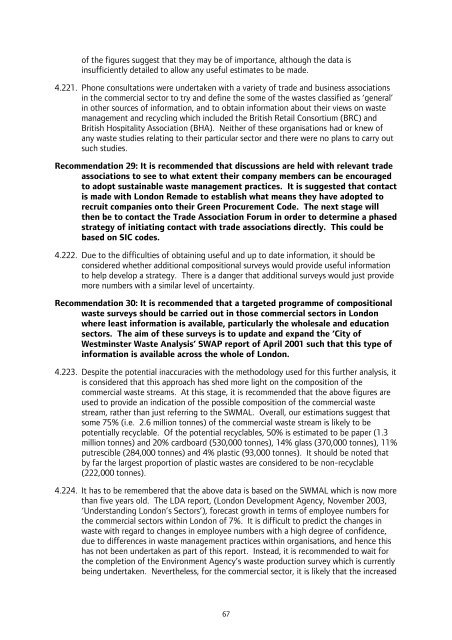London Wider Waste Strategy - London - Greater London Authority
London Wider Waste Strategy - London - Greater London Authority
London Wider Waste Strategy - London - Greater London Authority
Create successful ePaper yourself
Turn your PDF publications into a flip-book with our unique Google optimized e-Paper software.
of the figures suggest that they may be of importance, although the data is<br />
insufficiently detailed to allow any useful estimates to be made.<br />
4.221. Phone consultations were undertaken with a variety of trade and business associations<br />
in the commercial sector to try and define the some of the wastes classified as ‘general’<br />
in other sources of information, and to obtain information about their views on waste<br />
management and recycling which included the British Retail Consortium (BRC) and<br />
British Hospitality Association (BHA). Neither of these organisations had or knew of<br />
any waste studies relating to their particular sector and there were no plans to carry out<br />
such studies.<br />
Recommendation 29: It is recommended that discussions are held with relevant trade<br />
associations to see to what extent their company members can be encouraged<br />
to adopt sustainable waste management practices. It is suggested that contact<br />
is made with <strong>London</strong> Remade to establish what means they have adopted to<br />
recruit companies onto their Green Procurement Code. The next stage will<br />
then be to contact the Trade Association Forum in order to determine a phased<br />
strategy of initiating contact with trade associations directly. This could be<br />
based on SIC codes.<br />
4.222. Due to the difficulties of obtaining useful and up to date information, it should be<br />
considered whether additional compositional surveys would provide useful information<br />
to help develop a strategy. There is a danger that additional surveys would just provide<br />
more numbers with a similar level of uncertainty.<br />
Recommendation 30: It is recommended that a targeted programme of compositional<br />
waste surveys should be carried out in those commercial sectors in <strong>London</strong><br />
where least information is available, particularly the wholesale and education<br />
sectors. The aim of these surveys is to update and expand the ‘City of<br />
Westminster <strong>Waste</strong> Analysis’ SWAP report of April 2001 such that this type of<br />
information is available across the whole of <strong>London</strong>.<br />
4.223. Despite the potential inaccuracies with the methodology used for this further analysis, it<br />
is considered that this approach has shed more light on the composition of the<br />
commercial waste streams. At this stage, it is recommended that the above figures are<br />
used to provide an indication of the possible composition of the commercial waste<br />
stream, rather than just referring to the SWMAL. Overall, our estimations suggest that<br />
some 75% (i.e. 2.6 million tonnes) of the commercial waste stream is likely to be<br />
potentially recyclable. Of the potential recyclables, 50% is estimated to be paper (1.3<br />
million tonnes) and 20% cardboard (530,000 tonnes), 14% glass (370,000 tonnes), 11%<br />
putrescible (284,000 tonnes) and 4% plastic (93,000 tonnes). It should be noted that<br />
by far the largest proportion of plastic wastes are considered to be non-recyclable<br />
(222,000 tonnes).<br />
4.224. It has to be remembered that the above data is based on the SWMAL which is now more<br />
than five years old. The LDA report, (<strong>London</strong> Development Agency, November 2003,<br />
‘Understanding <strong>London</strong>’s Sectors’), forecast growth in terms of employee numbers for<br />
the commercial sectors within <strong>London</strong> of 7%. It is difficult to predict the changes in<br />
waste with regard to changes in employee numbers with a high degree of confidence,<br />
due to differences in waste management practices within organisations, and hence this<br />
has not been undertaken as part of this report. Instead, it is recommended to wait for<br />
the completion of the Environment Agency’s waste production survey which is currently<br />
being undertaken. Nevertheless, for the commercial sector, it is likely that the increased<br />
67
















